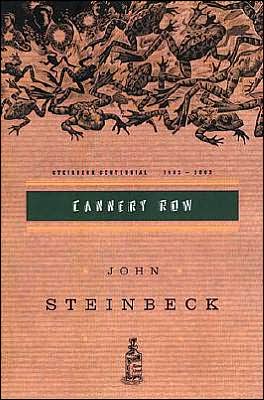yong | book 2 of 26 (right) | Cannery Row by John Steinbeck
 (Yep, same book as Rich.) What Rich said. Yeah. And having read the book, I can better appreciate the words he strung together, that before sounded pretty good but that I admittedly read with some skepticism, tasted the hook but didn't gulp down the line and the sinker, can now see how they totally jive with Steinbeck's Cannery flow. It's a short book but not a fast read. Kinda like life. Neat to read about day to day life in a place not so far away, place names I've visited, passed through, and at the same time truly far away, the era bygone, the places probably gone forever, gentrified to all hell. Most writers are hacks. They try, and you can tell they're trying. Steinbeck's a natural. Or his skills are unnatural. I read without doubting. Or at least not very much. I'm a natural doubter. Got a big head, can't help it. Rich, you know what I mean.
(Yep, same book as Rich.) What Rich said. Yeah. And having read the book, I can better appreciate the words he strung together, that before sounded pretty good but that I admittedly read with some skepticism, tasted the hook but didn't gulp down the line and the sinker, can now see how they totally jive with Steinbeck's Cannery flow. It's a short book but not a fast read. Kinda like life. Neat to read about day to day life in a place not so far away, place names I've visited, passed through, and at the same time truly far away, the era bygone, the places probably gone forever, gentrified to all hell. Most writers are hacks. They try, and you can tell they're trying. Steinbeck's a natural. Or his skills are unnatural. I read without doubting. Or at least not very much. I'm a natural doubter. Got a big head, can't help it. Rich, you know what I mean.The story's about life for people on the fringes of society. Salt of the earth types. Blue collar, and I mean really blue. Or maybe no collar. The type of people that you and I, and anyone else who'd be on a computer reading a blog, probably have no connection to, no idea what their lives are like, not two ships passing in the night but two ships on entirely different seas, one chugging along through the ocean doing its thing, the other sitting idle in some cove somewhere, just chilling, not needing to chug. Even those of us who think, Oh, we know blue collar, we're down with the salt of the earth, who really haven't the foggiest notion, like people who overuse the term "hole in the wall", like people who overuse the term "literally". I scoff at them, knowing I'm probably one myself.
Life can be a lonely thing. It can seem hopeless, pointless. But you can have nothing, and it can at other times be filled with connection. Warmth. Light. You can have nothing, and still have everything. We aren't so different. And we aren't so alone.
And that's Cannery Row. Wouldn't want you to go through two write-ups of a book and still feel like you had no idea what it was about.
You don't, do you?

